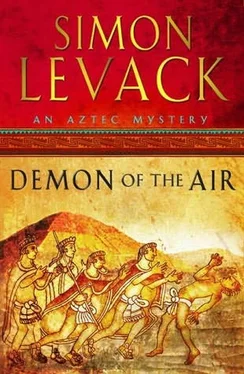Simon Levack - The Demon of the Air
Здесь есть возможность читать онлайн «Simon Levack - The Demon of the Air» весь текст электронной книги совершенно бесплатно (целиком полную версию без сокращений). В некоторых случаях можно слушать аудио, скачать через торрент в формате fb2 и присутствует краткое содержание. Год выпуска: 2012, Издательство: St. Martin, Жанр: Исторический детектив, на английском языке. Описание произведения, (предисловие) а так же отзывы посетителей доступны на портале библиотеки ЛибКат.
- Название:The Demon of the Air
- Автор:
- Издательство:St. Martin
- Жанр:
- Год:2012
- ISBN:нет данных
- Рейтинг книги:4 / 5. Голосов: 1
-
Избранное:Добавить в избранное
- Отзывы:
-
Ваша оценка:
- 80
- 1
- 2
- 3
- 4
- 5
The Demon of the Air: краткое содержание, описание и аннотация
Предлагаем к чтению аннотацию, описание, краткое содержание или предисловие (зависит от того, что написал сам автор книги «The Demon of the Air»). Если вы не нашли необходимую информацию о книге — напишите в комментариях, мы постараемся отыскать её.
The Demon of the Air — читать онлайн бесплатно полную книгу (весь текст) целиком
Ниже представлен текст книги, разбитый по страницам. Система сохранения места последней прочитанной страницы, позволяет с удобством читать онлайн бесплатно книгу «The Demon of the Air», без необходимости каждый раз заново искать на чём Вы остановились. Поставьте закладку, и сможете в любой момент перейти на страницу, на которой закончили чтение.
Интервал:
Закладка:
3
So much has happened since the days when the priests sacrificed to the gods at the summit of the Great Pyramid. No doubt the old ways now seem strange and barbaric, and people wonder what it was all about, and why so many had to die under the Fire Priest’s flint knife.
This is what we were taught.
The World had been destroyed four times: by ravening jaguars, by the wind, by a rain of fire and by a flood. Each time the people had perished or been transformed beyond recognition, and so after the flood, at the beginning of the present age, the gods had to repopulate the Earth.
After the last catastrophe one of their number, Quetzalcoatl, the Feathered Serpent, went down into Hell to gather up the bones of the dead. However, even after he had retrieved them and had them ground up into powder, there was still no life in them. He had to slit his member and add his own blood to the powder to make a paste from which the first man and woman could be molded, and the other gods had to do likewise. The gods gave us life with their blood, and our debt to them could only be repaid with blood.
What is more, we believed that without the daily tribute of human hearts, the Sun would not move. This part of the story went like this: after men and women had been created, the World was still in darkness, and so the gods gathered to re-create the Sun. They built a great fire and called on a splendid, richly adorned god to leap into itto be burned and reborn as the Sun. However, the fire was too hot, and while this magnificent god shrank from the fierce flames, the despised, wizened, pimply and disgusting god Nanahuatzin leaped past him into the inferno. As Nanahuatzin’s flesh blistered in the fire, shame overcame the splendid god’s fear and he jumped into the blaze as well. Nanahuatzin became the Sun and his magificent rival, the Moon. At first each was as bright as the other, but the other gods threw a rabbit in the Moon’s face to dim his light, and we see the rabbit’s shape on the Moon’s face to this day.
Now the Sun and the Moon had been born, but they would not rise. They sat on the horizon, wobbling uncertainly, until the remaining gods sacrificed themselves to give them the energy they needed to move through the sky. Quetzalcoatl cut the other gods’ hearts out, throwing them into the fire before leaping into it himself. Then the first day began, thanks to the self-sacrifice of the gods, and we believed we had to follow their example, for if the gods were denied their feast of human hearts and blood, then the World would end.
But we were like gods ourselves! No Aztec, not even the Emperor, believed himself to be a god, but we and the gods were partners in the struggle to sustain the Sun in his progress through the sky. Why else had the gods elevated our city over all others, to be the greatest in the World? Why else were our armies sent forth, but to gather captives for the Flowery Death, as we called it? Why else did we join in the gods’ feasting, eating the flesh of those who died on the killing stone while the gods were consuming their hearts?
We gave our own blood freely enough, and all Aztecs took part in this, piercing our earlobes whenever we were called upon to repay a little of what we owed. Priests used to go further, slitting their tongues and penises with obsidian knives and drawing ropes through them, and presenting the bloodied ropes as a mark of their devotion. But the most precious offering, the gift of hearts that made the Sun rise, came mostly from captive enemy warriors and slaves bought for the purpose.
Enemy warriors were the most prized victims and the greater a man’s prowess in battle the more the gods would savor his heart. The Aztec warrior who captured a distinguished opponent and presented him to be sacrificed could expect great rewards: lavish gifts from theEmperor’s hand, the right to wear cotton and sandals in the city and have his hair arranged in a certain style, the right to eat at the palace and drink sacred wine. Above all he would have what all Aztecs craved: fame and the chance to vaunt himself in front of his fellows.
Some slaves were almost as valuable as captured warriors. These were the Bathed Slaves, purchased at great expense and pampered and groomed and bathed until they were a worthy gift for the god they were to die for. It was a great honor to be allowed to present one of these slaves. It meant shouldering some of the burden of the debt we owed to the gods and being allowed to act like a mighty warrior for a day.
No group within the city competed for this honor more fiercely than the merchants. No matter how wealthy he was, the merchant’s demeanor was modest, marked by a cloak of coarse maguey fiber cloth instead of cotton, long, loose hair like a commoner’s and bare feet instead of sandals. This was only prudent in a city where wealth earned through trade, rather than as a reward for great deeds on the battlefield, was viewed with envy and contempt. Once in a while, however, a few selected merchants were allowed to dress up as warriors and present expensive slaves for sacrifice as if they had personally dragged them home from the wars. Such an occasion was the war-god’s great Festival of the Raising of Banners.
I knew what preparations the young man who had presented our offering would have made for this festival. He would have gone to Azcapotzalco, the town that boasted the World’s greatest slave market, where he would have picked his man out from among the strongest and most beautiful the dealers had to offer. The slave would have been put through his paces. The merchant would have squeezed his muscles, looked into his eyes and mouth, inspected his body for blemishes, and watched him dance to the beat of a two-toned drum. A good dancer was worth a fortune, and he may have cost our young merchant forty of the large capes we used for money. Then he would have led his slave home and shut him in a wooden cage.
I sometimes wondered what made so many Bathed Slaves go unprotesting to their deaths. No doubt some believed our poets when they sang of the sweetness of a Flowery Death and looked forward to joining the dead warriors who escorted the Sun toward his zenithand were reborn on earth as hummingbirds or butterflies. Others probably just resigned themselves, but I suspected that for many, caught up in the ritual of the festival, whatever they may have done in their previous lives-all the decisions and mistakes and accidents that had led to their being paraded before prospective buyers in the market-it must have seemed remote and strange, and the flint knife the only thing of substance that remained.
The Bathed Slave was given a fine cotton cape and breechcloth, along with a long curved labret, pointed quetzal feathers for his ears, rattles made of ocelot skin and seashell for his ankles and strips of gold, turquoise, coral and obsidian to bind in his hair. He was given tobacco and flowers and good food. Then he was made to dance.
For four nights he danced to the sound of drums, gliding through the steps of the Snake Dance before the admiring gazes of the young merchant’s family and guests. On the third night he was given more clothes and adornments: a feather-bordered jacket, colored blue, black and red and decorated with skulls and bones, a feather headdress, dyed turquoise with white pendants, obsidian sandals, brightly painted wooden earplugs, falcon wings of paper. These were sacred, and the man who wore them must have felt himself changed, a step further along the road toward his death and transfiguration.
On that third night, also, he met his companions on that road-the escorts hired to stop him running away at the last moment, the priest who would supervise his vigil during his last night on Earth and his bather, the grotesquely motherly old woman who would tenderly wash his face, cosset him and speak soothingly to him and be with him constantly until he died.
Читать дальшеИнтервал:
Закладка:
Похожие книги на «The Demon of the Air»
Представляем Вашему вниманию похожие книги на «The Demon of the Air» списком для выбора. Мы отобрали схожую по названию и смыслу литературу в надежде предоставить читателям больше вариантов отыскать новые, интересные, ещё непрочитанные произведения.
Обсуждение, отзывы о книге «The Demon of the Air» и просто собственные мнения читателей. Оставьте ваши комментарии, напишите, что Вы думаете о произведении, его смысле или главных героях. Укажите что конкретно понравилось, а что нет, и почему Вы так считаете.












